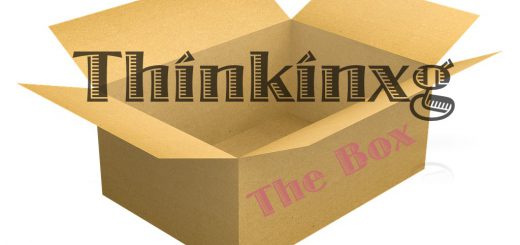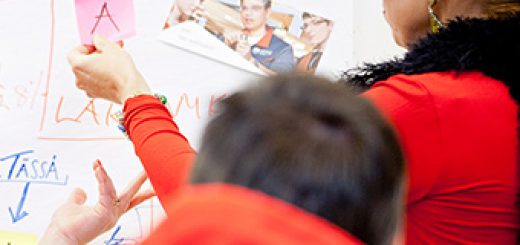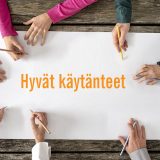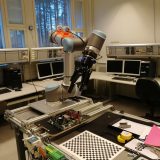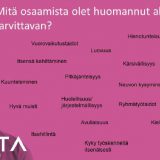Sustainable Development and the Age of Competence
Let me first say what I don’t mean by “development” (or by its common translation into Finnish – “kehitys”) The Finnish term for “sustainable development” is “kestävä kehitys” and “kehitys” must not be confused with “progress” (“edistys”) or “growth” (“kasvu”) although they seem to form an ideological combo in certain discourses. (c.f. Bresser-Pereira 2013) Furthermore, the notion of development in the context of the human condition and society is rooted in a particular modernist worldview which is not entirely free of bias (c.f. Lippert 2004, 8-9). Thus, development in this text is considered to be the development of competence, of human capacity to learn and is considered asan essential component of the much talked-about resilience. However, let me start with the Enlightenment.

Kuvaaja: Kimmo Kuortti
The idea of progress has its roots in the Enlightenment philosophy. The core of this notion of progress is the improvement of human condition. There was a strong moral and human aspect to this notion. However, great leaps in science and technology, the industrial revolutions (first, second and the third) and the ensued increased productivity shifted the focus of the idea of progress: the improvement of human condition became more materialistic and in fact over time lead to the unsustainable exploitation of natural resources. The idea of human development became technocratic and the abundancy in material well-being replaced or at least overshadowed other qualities as goals for the development of the human condition.
The central role of economics as a discipline must not be downplayed either. The aforementioned notion of progress conflated with the idea of conventional development (as opposed to the sustainable development). This by itself would not necessarily have created a socio-ideological apparatus capable of framing a politically winning messages but combined with the idea of economic growth it created a powerful ideology which served as the backbone of the Western world and to an extent still does. In fact, the report, which brought the global crisis on the global agenda and popularised the concept of sustainable development also stresses the idea of growth:
“However, these specific measures must be located in a wider context of effective cooperation to produce an international economic system geared to growth and the elimination of world poverty.” (Our Common Future, From One Earth to One World)
Sustainable development is founded on the critique of the conventional development (Cheever & Dernbach, 2015, 7). As pointed out above, the classical definition of sustainable development seems to include the idea of economic growth. This is a contradiction if we accept that the focus on growth is the cause of the global unsustainability. Thus growth cannot be the solution to the problem it has created. (Lipper, 22)
As can be seen, sustainable development is a contested idea. It has inbuilt contradictions and some ideological traits which are ethically unsustainable. It is the ethical aspects to which I now turn as I deal with the contribution of teacher education and its role in the sustainable development of competence.

Kuvaaja: Kimmo Kuortti
The continuous betterment of society is founded on the sustainability of our choices. The measurement of this sustainability is ethics. The instantiations of the choices involve individual people in social contexts, in relation to other people. The competence-based teacher education seeks to develop competences which are defined in cooperation with various professions in the vocational sector, with domestic and foreign educational authorities and with the practicing professionals in the field of teaching.
One more discussion on definitions is needed before finally making an attempt at sketching sustainable development of competences.
Competence-based education in the context of Finnish professional teacher education is defined as teacher education which starts with the learner’s prior competence in the competence areas defined in the curriculum. The learner’s competence and their ability to demonstrate that competence is assessed. Based on that assessment the teacher student designs a personal study path the goal of which is to achieve the competence goals defined in the curriculum.
Considering all of the above, sustainability in competence-based teacher education can encompass the following aspects:
- recognition of each student’s prior learning, i.e. the avoidance of demotivating the learner and using the learner’s and the tutors’/teachers’ resources sustainably
- developing an elasticity for continuous professional development throughout the teacher’s career, i.e. maximising the potential for accumulating competence capital with long-term effects on the next generation of learners (as well as colleagues) within the teacher’s sphere of influence
- minimising discontinuities in careers
- developing professional and personal resilience
- critical approach to existing paradigms (political, educational, economic, etc) in society
- teacher’s active role in affecting the future of their pedagogical profession as well as the vocational professions with which their activities are connected

Kuvaaja: Kimmo Kuortti
The above sketch admittedly ignores the more common aspects of sustainability such as the energy efficiency, production of teaching materials, travel or food consumption patterns in student restaurants. Those may be dealt with at later articles.
The focus of this text was on what sustainability could mean from the point of view of competence-based teacher education, as a tool for empowering individuals to sustain their capacity for good in the current world.
In the words of Robert Woollard (2000, 3) – even though maybe a little pessimistic in their original context – we may find a glimpse of hope and an inkling of a guideline:
“Somewhere along the road to our present crisis we lost the idea of ‘enough.’ Somehow the twentieth century’s version of progress lost its compass and began to see ‘more’ as the only desirable direction. […] [W]e never sought to reflect on where we were but became obsessed with where we might be.”
Kirjoittaja
Kimmo Kuortti
Lehtori
Oulun ammattikorkeakoulu
Ammatillinen opettajakorkeakoulu
List of sources and further reading:
Bresser-Pereira, L.C. 2013. Development, progress and economic growth. Sao Paulo School of Economics.
https://pdfs.semanticscholar.org/5ca5/34e1ac72f447a664e5ced79242dce3e21f0c.pdf (retrieved: November 11th, 2019)
Cheever, F., Dernbach J.C. 2015. Sustainable Development and its Discontents. University of Denver.
https://digitalcommons.du.edu/cgi/viewcontent.cgi?article=1021&context=law_facpub (retrieved: November 11th, 2019)
Lipper, I. 2004. An Introduction to the Criticism on Sustainable Development. Brandenburg University of Technology.
https://www.researchgate.net/publication/280142305_An_Introduction_to_the_Criticism_on_Sustainable_Development#pfa (retrieved: November 11th, 2019)
Our Common Future. World Commission on Environment and Development 1987.
http://www.un-documents.net/ocf-ov.htm (retrieved: November 11th, 2019)
Woollard, R. F. 2000. Introduction: Fatal consumption (When too much is not enough). In R. Woollard & A. Ostry (Eds.), Fatal consumption: Rethinking sustainable development (pp. 3-20). Vancouver: UBC Press.
Further reading (and seeing and listening) on competence-based education:
In Finnish:
Alaniska, H., Keurulainen, H., Tauriainen, T.2019. Osaamisperustaisia käytäntöjä korkeakouluissa. Oulun ammattikorkeakoulun tutkimus- ja kehitystyön julkaisut.
http://www.oamk.fi/epooki/2019/osaamisperustaisia-kaytantoja-korkeakouluissa/
(retrieved: November 11th, 2019)
Mitä osaamisperustaisuus on?
https://ohjaan.fi/mita-osaamisperustaisuus-on/ (retrieved: November 11th, 2019)
In English:
Curry,L, Docherty, M. 2017. Implementing Competency-based Education. In Collected Essays on Learning and Teaching, v10 p61-73. Society for Teaching and Learning in Higher Education.
https://files.eric.ed.gov/fulltext/EJ1147189.pdf (retrieved: November 11th, 2019)
Oulu University of Applied Sciences, School of Professional Teacher Education, Study Guide
https://www.oamk.fi/opinto-opas/en/school-professional-teacher-education/professional-teacher-education/competence-based-education (retrieved: November 11th, 2019)
Patrick,S., Kennedy,K., Powell, A. 2013. Mean What You Say: Defining and Integrating Personalized, Blended and Competency Education. International Association for K-12 Online Learning.

